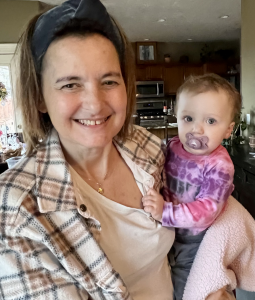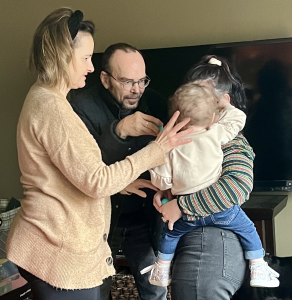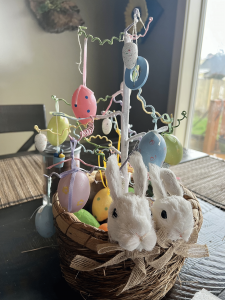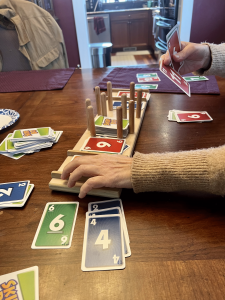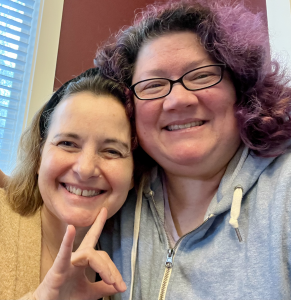June is DeafBlind month. To honor the month, I asked my longtime friend, Lorie Szynal-Rich, to share her experiences as a DeafBlind woman, mother, and grandmother. She is also a Pro-Tactile actress.
Please tell us a little bit about yourself (ex. where you’re from, school, college, work, life).
I grew up in Massachusetts, went to Boston School for the Deaf, and also went to mainstream classes in a parallel setting. Then, I went to Newbury Junior College, earned AS degree in fashion design, and then transferred to Gallaudet University. In 2003, I graduated from Gallaudet with a degree in finance and economics.
I worked as an accounting technician at the US Forestry Service Department for 3 years. I also worked as a bridal shop alternation and dressmaker for a year. Then after I got married, I became a domestic home engineer (aka housewife) for 29+ years, raising two children. Now I’m a grandmother to a 16-month-old granddaughter.
What type of blindness do you have? Is it hereditary?
I have Usher’s Syndrome Type 1. It’s unknown if it’s hereditary or not.
When did you first realize that your vision wasn’t the same as others and how old were you? What happened?
Growing up, I didn’t notice it. However, I have balance issues. My family noticed it. When I was 16, the state of Massachusetts required an eye exam to receive a driver’s license, and that was when I was diagnosed. I still went ahead and got my license with a warning from the doctor not to drive at nighttime.
After receiving the diagnosis, what was the first thing you proactively did to adapt and still retain your independence?
At first, after I got the diagnosis, I didn’t think it was a big deal. I went on with my life as normally as possible. When I was at Gallaudet University, I met other people with Usher’s Syndrome too. I was still fine with it, like it was still not a big deal.
One day, I was driving with my husband and two big trucks sandwiched my car. It made my husband nervous and he told me to pull over so he could drive. My husband had shared with me that he wasn’t comfortable with me driving haphazardly, and strongly encouraged me to stop driving.
So at that time, it impacted me emotionally and mentally as I realized the severity of my vision limits. There were a lot of new emotions regarding the sudden reduction of independence and the addition of adaptations to meet my visual needs. It was when I went to the DeafBlind camp and learned a lot of things such as having SSPs (Support Service Providers).
Did you receive any DeafBlind training to enhance your knowledge, skills, and independence? What are they and are they still helpful today since you completed it? Is it important to continue the training(s), how often and why?
Yes. I went to National Helen Keller Center for a 6-month training. The training provided independent living skills including cooking, workplace adaptions, Braille, adaptive technology, and cane mobility. That training still benefits me today and helped me regain some of my independence.
Yes. I still have ongoing training in some areas like cane mobility. That training is truly crucial because my vision has changed over time. So, I need to adapt to keep using the skill. It is recommended to renew or touch up on the training skill every 6 months for a few months (bi-weekly practices with Support Service Provider).
What are your proudest achievements? Which one is your favorite and why?
Gaining the Pro-Tactile skill. It has given me more confidence and increased my independence.
Being involved in the Pro-Tactile Theatre is probably my utmost achievement and pride. That is because it’s where we educate sighted people and Deaf-Blind people to create a more inclusive space.
For anyone, who just got diagnosed with limited vision, full blindness, or DeafBlind and is uncertain of what to do next, what would your advice to them?
I just learned that Usher’s Syndrome and DeafBlindness are two different things. For example, people with Usher’s Syndrome have some vision. They can see a movie or go to an event, like a baseball game. Some people with other kinds of DeafBlindness cannot see much or at all. They require more accommodations and assistance.
The advice I would give is to be fully prepared. Learn how to read Braille and communicate in Pro-Tactile. That way, they’d gain some independence and not be fully isolated which can cause the development of mental health issues. Also, get support and services like Support Service Providers and Pro-Tactile trained interpreters.
For the “sighted” world, who don’t know much about the DeafBlind, what would you share to help them to better understand and grow their awareness?
DeafBlind is where the person cannot see or hear. They require Pro-Tactile communication. However, if the sighted person doesn’t know sign language or ABCs, they can write on paper. To make this accessible, have the DeafBlind person’s hand on the sighted person’s hand while they write. The DeafBlind person can feel the movement of each written letter. Then, tap on the DeafBlind person’s shoulder to let them know that it’s their turn to say something. When guiding the DeafBlind person, allow them to place their hand on the sighted person’s elbow (inner part of the arm), not on the hand.
What is the correct terminology for DeafBlind people, if any? And what are labels that are not okay to use?
The label Usher’s Syndrome is not always appropriate as more and more DeafBlind people prefer to be labeled as DeafBlind. The reason is that some people think Usher’s Syndrome gives the impression that their vision is similar to a horse wearing blinders and they feel mocked by that.
Are DeafBlind people’s culture and language the same as Deaf culture and American Sign Language? If they’re different, how so?
No. There are two groups of DeafBlind people. The first group is called Tactile American Sign Language (TASL) which means they use both Pro-Tactile and ASL. The second group is called Pro-Tactile which means they mainly use Pro-Tactile only, no ASL, and more touching. It’s more autonomy. TASL has a wider sign space along with some touching. Pro-Tactile does not have wider space. It’s a more narrow space with more touches. Both groups have different rules.
If a DeafBlind person is already fluent in ASL, can they be bilingual in both ASL and Pro-Tactile?
It depends on the DeafBlind person’s preferences. The goal is to become fully Pro-Tactile but in some cases, like using the video chat with someone who is a Pro-Tactile “interpreter”, they can use American Sign Language for the sighted viewers, who have knowledge of ASL.
Do you have any additional information you would like to share that’s not mentioned here but is essential to mention?
What I would like to add is with the group of DeafBlind people, it is important that they’re very near to one another and keep their hands on one another to keep the communication flow. They always keep their hands on each other and never let go or leave the body. This is so the DeafBlind person won’t get lost.
This concludes the interview with Lorie Szynal-Rich. Thank you Lorie for your time and for sharing about your DeafBlind world! It is truly important information.
‘Til next time, ta ta! 😄🤟🏻



